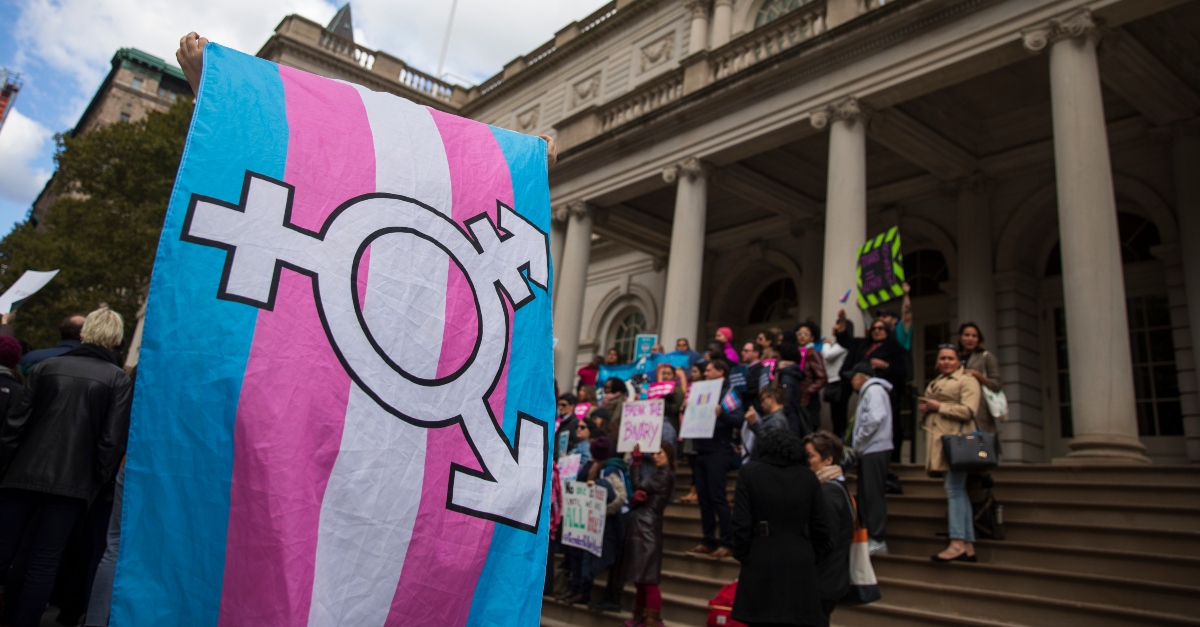
LGBT activists and their supporters rally in support of transgender rights on the steps of New York City Hall, Oct. 24, 2018, in New York City.
The Second Circuit Court of Appeals upheld Connecticut’s inclusive policy allowing transgender students to compete in athletic competitions, rejecting the claim that the runners who sued over the policy wrongly lost their “chance to be champions.”
The case, filed by former student athletes Chelsea Mitchell, Ashley Nicoletti, Alanna Smith, and Selina Soule, argued that their transgender competitors Andraya Yearwood and Terry Miller had an unfair advantage from being assigned male at birth.
The federal appeals court, however, found that claim was even belied by the school’s record.
“All four Plaintiffs regularly competed at state track championships as high school athletes, where Plaintiffs had the opportunity to compete for state titles in different events. And, on numerous occasions, Plaintiffs were indeed ‘champions,’ finishing first in various events, even sometimes when competing against Yearwood and Miller,” Senior U.S. Circuit Judge Denny Chin, a Barack Obama appointee, wrote for the three-judge panel. “Plaintiffs simply have not been deprived of a ‘chance to be champions.'”
U.S. Circuit Judges Susan Carney, also an Obama appointee, and Beth Robinson, a Joe Biden appointee, joined the decision.
They unanimously rejected the notion that the four athletes had standing to file Title IX allegations, with their high-school track days now long behind them.
“Plaintiffs also alleged in their Complaint that maintaining the current records affects their college recruitment and scholarship opportunities,” they wrote in a footnote. “This claim, however, is now moot because all Plaintiffs have graduated from high school, have matriculated at undergraduate institutions, and are competing on collegiate track-and-field teams; it would be impossible, at this point, for an injunction correcting the records to grant Plaintiffs improved college recruitment opportunities.”
The lawsuit also sought a court injunction to rewrite the high school records in races where the transgender athletes defeated them.
The judges found that even if an injury were proven, it couldn’t be redressed.
“It is not apparent that an injunction to rewrite the records would redress Plaintiffs’ alleged deprivation — revising the records would not give Plaintiffs ‘a chance to be champions,'” the ruling states. “Plaintiffs’ injury of being deprived of a ‘chance to be champions’ could be remedied only with damages for past deprivation, or with an injunction requiring do-overs of the races. But the former, as explained below, are unavailable to Plaintiffs, and Plaintiffs do not seek the latter. Indeed, the races were run in conformity with the rules in effect at the time; times were recorded; medals for gold, silver and bronze were in fact awarded to athletes who finished first, second, and third; and the records accurately reflect those results.”
The American Civil Liberties Union’s senior staff attorney for its LGBTQ & HIV Project, Joshua Block, praised the ruling as a “a critical victory for fairness, equality, and inclusion.”
“The court rejected the baseless zero-sum arguments presented by the opposition to this policy and ultimately found transgender girls have as much a right to play as cisgender girls under Title IX,” Block said. “This critical victory strikes at the heart of political attacks against transgender youth while helping ensure every young person has the right to play.”
The plaintiffs’ attorney did not immediately respond to Law&Crime’s request for comment.
Read the ruling here.
[Image via Drew Angerer/Getty Images]